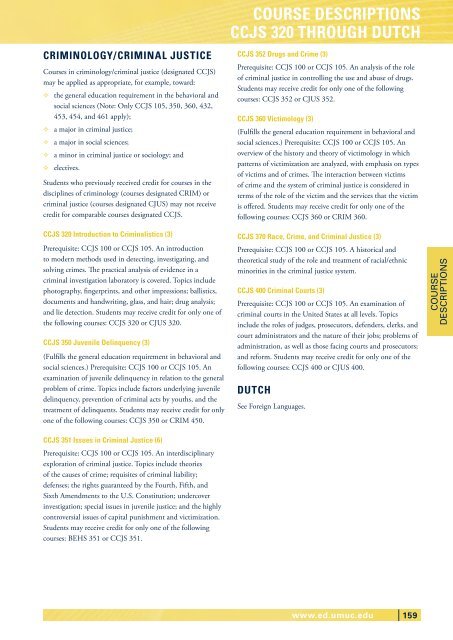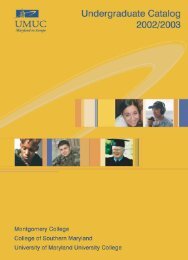UNDERGRADUATE CATALOG - UMUC Europe
UNDERGRADUATE CATALOG - UMUC Europe
UNDERGRADUATE CATALOG - UMUC Europe
Create successful ePaper yourself
Turn your PDF publications into a flip-book with our unique Google optimized e-Paper software.
CRiminology/CRiminAl JustiCE<br />
Courses in criminology/criminal justice (designated CCJS)<br />
may be applied as appropriate, for example, toward:<br />
G the general education requirement in the behavioral and<br />
social sciences (Note: Only CCJS 105, 350, 360, 432,<br />
453, 454, and 461 apply);<br />
G a major in criminal justice;<br />
G a major in social sciences;<br />
G a minor in criminal justice or sociology; and<br />
G electives.<br />
Students who previously received credit for courses in the<br />
disciplines of criminology (courses designated CRIM) or<br />
criminal justice (courses designated CJUS) may not receive<br />
credit for comparable courses designated CCJS.<br />
CCJs 320 introduction to Criminalistics (3)<br />
Prerequisite: CCJS 100 or CCJS 105. An introduction<br />
to modern methods used in detecting, investigating, and<br />
solving crimes. The practical analysis of evidence in a<br />
criminal investigation laboratory is covered. Topics include<br />
photography, fingerprints, and other impressions; ballistics,<br />
documents and handwriting, glass, and hair; drug analysis;<br />
and lie detection. Students may receive credit for only one of<br />
the following courses: CCJS 320 or CJUS 320.<br />
CCJs 350 Juvenile delinquency (3)<br />
(Fulfills the general education requirement in behavioral and<br />
social sciences.) Prerequisite: CCJS 100 or CCJS 105. An<br />
examination of juvenile delinquency in relation to the general<br />
problem of crime. Topics include factors underlying juvenile<br />
delinquency, prevention of criminal acts by youths, and the<br />
treatment of delinquents. Students may receive credit for only<br />
one of the following courses: CCJS 350 or CRIM 450.<br />
CCJs 351 issues in Criminal Justice (6)<br />
Prerequisite: CCJS 100 or CCJS 105. An interdisciplinary<br />
exploration of criminal justice. Topics include theories<br />
of the causes of crime; requisites of criminal liability;<br />
defenses; the rights guaranteed by the Fourth, Fifth, and<br />
Sixth Amendments to the U.S. Constitution; undercover<br />
investigation; special issues in juvenile justice; and the highly<br />
controversial issues of capital punishment and victimization.<br />
Students may receive credit for only one of the following<br />
courses: BEHS 351 or CCJS 351.<br />
CouRsE dEsCRiPtions<br />
CCJs 320 tHRougH dutCH<br />
CCJs 352 drugs and Crime (3)<br />
Prerequisite: CCJS 100 or CCJS 105. An analysis of the role<br />
of criminal justice in controlling the use and abuse of drugs.<br />
Students may receive credit for only one of the following<br />
courses: CCJS 352 or CJUS 352.<br />
CCJs 360 victimology (3)<br />
(Fulfills the general education requirement in behavioral and<br />
social sciences.) Prerequisite: CCJS 100 or CCJS 105. An<br />
overview of the history and theory of victimology in which<br />
patterns of victimization are analyzed, with emphasis on types<br />
of victims and of crimes. The interaction between victims<br />
of crime and the system of criminal justice is considered in<br />
terms of the role of the victim and the services that the victim<br />
is offered. Students may receive credit for only one of the<br />
following courses: CCJS 360 or CRIM 360.<br />
CCJs 370 Race, Crime, and Criminal Justice (3)<br />
Prerequisite: CCJS 100 or CCJS 105. A historical and<br />
theoretical study of the role and treatment of racial/ethnic<br />
minorities in the criminal justice system.<br />
CCJs 400 Criminal Courts (3)<br />
Prerequisite: CCJS 100 or CCJS 105. An examination of<br />
criminal courts in the United States at all levels. Topics<br />
include the roles of judges, prosecutors, defenders, clerks, and<br />
court administrators and the nature of their jobs; problems of<br />
administration, as well as those facing courts and prosecutors;<br />
and reform. Students may receive credit for only one of the<br />
following courses: CCJS 400 or CJUS 400.<br />
dutCH<br />
See Foreign Languages.<br />
www.ed.umuc.edu 159<br />
CoURsE<br />
dEsCRiPTions






